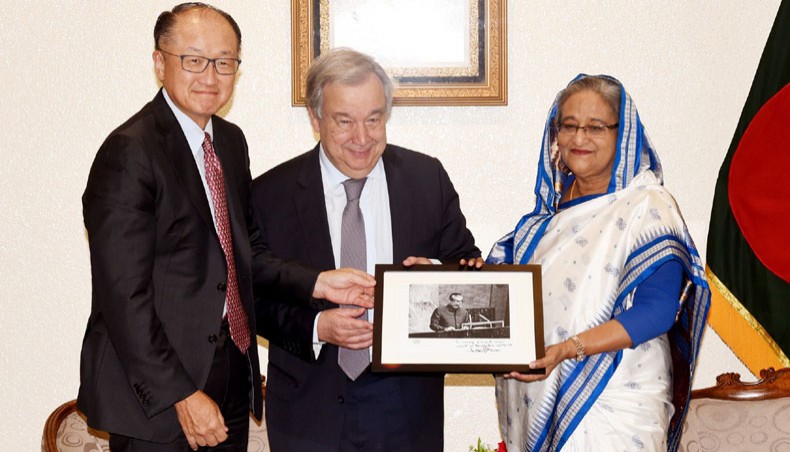ROHINGYA CRISIS It’s a global responsibility: UNSG
United Nations secretary general Antonio Guterres on Sunday said in Dhaka that the response to the crisis involving forcibly displaced Rohingya people from Myanmar was a global responsibility instead of putting burden on Bangladesh alone.
The UN was required to put more pressure on Myanmar to make the authorities in the country understand what steps they should talk on resolving the Rohingya crisis, he said in a meeting with prime minister Sheikh Hasina at her office.
International Committee of the Red Cross president Peter Maurer said conditions in Rakhine State of Myanmar were not conducive for return of the Rohingyas.
‘The response to this crisis is not a Bangladeshi responsibility; it’s a global one,’ Guterres, now here on a three-day visit, said in a tweet after a meeting with prime minister Sheikh Hasina.

President of the International Committee of the Red Cross (ICRC) Peter Maurer talks to a Rohingya refugee woman during his visit to Chakmarkul refugee camp in Teknaf on Sunday. — AFP photo
‘We’re keeping up pressure on Myanmar…we need to put more pressure on Myanmar to make them understand what they should do on the issue,’ he told the prime minister, according to United News of Bangladesh.
Prime minister’s press secretary Ihsanul Karim briefed journalists after the meeting. World Bank president Jim Yong Kim was also present in the meeting.
Guterres mentioned that the international community reiterated their solidarity with Bangladesh on Rohingya issue and appreciated the Bangladesh government and the host community in Cox’s Bazar for giving shelter to the victims.
The UN and the World Bank would continue their support to Bangladesh over the Rohingya issue, he assured.
Hasina appraised them about the current situation of the Rohingya people and said these people started entering Bangladesh since 1977.
Bangladesh allowed about 1.1 million Rohingyas only on humanitarian ground and was providing them with various services, including healthcare, on a regular basis, she said.
The government is preparing an island to relocate around 100,000 Rohingya, where they would get better living conditions and livelihood, she told them.
Hasina informed them that local people in Cox’s Bazar were experiencing adverse impacts as over one million people took shelter in the locality and the government would need to address their problem too.
As the UN and the WB chiefs enquired about implementation of the agreements, signed with Myanmar, the prime minister alleged that the Myanmar authorities were not taking measures for implementation of the agreements on resolving Rohingya issues.
The UN and the WB chiefs and other top officials of the two organisations are set to visit Rohingya camps in Cox’s Bazar today. Foreign minister AH Mahmood Ali, foreign secretary M Shahidul Haque and UNHCR high commissioner Filippo Grandi would accompany them in the trip.
Hasina hosted a dinner in honour of the foreign dignitaries on Sunday evening at a city hotel.
International Committee of the Red Cross president Peter Maurer visited Rohingya camps in Cox’s Bazar on Sunday. ‘This is a loss-loss situation for people,’ he said in a tweet from the camps.
After visiting Rohingyas at Chakmarkul camp in Cox’s Bazar, he said, ‘Conditions are confronting, people are surviving, not living. There’s little clean water, electricity or education and even less hope.’
Maurer visited strife-torn western Myanmar before visiting refugee camps over the border in neighbouring Bangladesh.
‘What I’ve seen in terms of destruction of villages, abandonment of situations, disruption in markets, of livelihood, of communities, I don’t think the present moment is an ideal condition to return,’ he said, according to Agence France-Presse.
He stressed the need for preparing the ground for voluntary return of Rohingya people to Rakhine State.
About 7,00,000 Rohingyas, mostly women, children and aged people, entered Bangladesh fleeing unbridled murder, arson and rape during ‘security operations’ by Myanmar military in Rakhine, what the United Nations denounced as ethnic cleansing and genocide, beginning from August 25, 2017.
The ongoing Rohingya influx took the number of undocumented Myanmar nationals and registered refugees in Bangladesh to about 11,16,000, according to estimates by UN agencies and Bangladesh foreign ministry.
Bangladesh and Myanmar were engaged in a slow process of preparations with the UN agencies for starting repatriation of Rohingyas.
The two governments have signed three instruments since November 23, 2017, for return of Rohingyas sheltered in Bangladesh after October 2016, as the Rohingya exodus from Rakhine State continued.
Bangladesh and Myanmar governments signed two memorandums of understanding with UN agencies to ensure voluntariness of the returnees and facilitate safe and dignified return to Rakhine State.
Majority of the international community, including most of the UN Security Council members excluding China and Russia, were also asking for making persons responsible for persecution on Rohingyas accountable in addition to return of the victims to home.
International Criminal Court asked Myanmar to provide observation by July 27 over jurisdiction of the court in hearing a case on the alleged deportation of Rohingya minorities to Bangladesh.
News Courtesy: www.newagebd.net











